“On our earth, before writing was invented, before the printing press was invented, poetry flourished. That is why we know poetry is like bread; it should be shared by all, by scholars and by peasants, by all our vast, incredible, extraordinary family of humanity.” (Pablo Neruda)
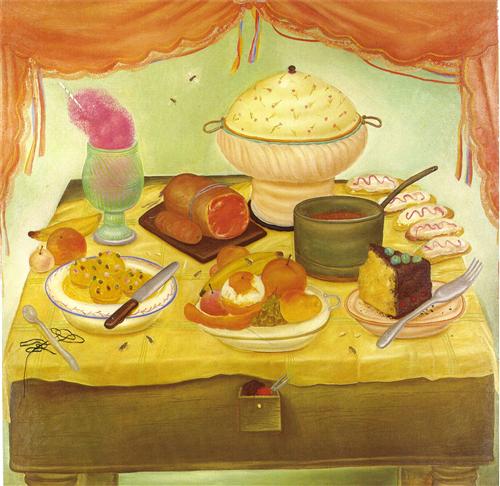
One would think there would be just as many poetry anthologies about food as there are about love. After all, as human beings we need and crave both, and what better way to nourish our minds, hearts and souls than with a delectable volume of verse devoted to celebrating and exploring the role food plays in our lives?
Oddly enough, poetry books for the adult reader devoted solely to food are few and far between. Food poems can certainly be found sprinkled throughout general poetry collections featuring other subjects, or in books with a food theme that also contain essays, excerpts from longer works of fiction and nonfiction, along with bits of tantalizing miscellany. But a good anthology with food poems as the main attraction? “Please sir, I want some more.”
Today’s menu features ten favorites I pulled from my shelves. Whenever you’re hungry for a little smackerel of something — dip, sip, savor, nibble and nosh on the poems found in these toothsome culinary collections. They’ll surely satisfy your cravings (several also contain recipes). 🙂 If you know of any others, please share in the comments. Enjoy!
* * *
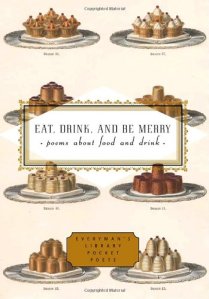 Eat, Drink, and Be Merry: Poems about Food and Drink, selected by Peter Washington (Everyman’s Library Pocket Poets/Knopf, 2003). All kinds of foods and beverages are laid out in these pages, along with picnics and banquets, intimate suppers and quiet dinners, noisy parties and public celebrations–in poems by Horace, Catullus, Hafiz, Rumi, Rilke, Moore, Nabokov, Updike, Mandelstam, Stevens, and many others.
Eat, Drink, and Be Merry: Poems about Food and Drink, selected by Peter Washington (Everyman’s Library Pocket Poets/Knopf, 2003). All kinds of foods and beverages are laid out in these pages, along with picnics and banquets, intimate suppers and quiet dinners, noisy parties and public celebrations–in poems by Horace, Catullus, Hafiz, Rumi, Rilke, Moore, Nabokov, Updike, Mandelstam, Stevens, and many others.
From Sylvia Plath’s ecstatic vision of juice-laden berries in “Blackberrying” to D. H. Lawrence’s lush celebration of “Figs,” from the civilized comfort of Noël Coward’s “Something on a Tray” to the salacious provocation of Swift’s “Oysters,” from Li Po on “Drinking Alone” to Baudelaire on “The Soul of the Wine,” and from Emily Dickinson’s “Forbidden Fruit” to Elizabeth Bishop’s “A Miracle for Breakfast,” Eat, Drink, and Be Merry serves up a tantalizing and variegated literary feast.
A charming tasting table, with poets classic to modern, famous and not so famous. There is an emphasis on light verse, a welcome treat for the literary palate, served up in eight “courses”: Plain Food, Square Meals, Fruit, Vegetables, Delicatessen, The Food of Love, Feasting and Fasting, and Liquor is Quicker. About 140 delectable poems.
FOOD
by John UpdikeIt is always there,
Man’s real best friend.
It never bites back;
it is already dead.
It never tells us we are lousy lovers
or asks us for an interview.
It simply begs, Take me;
it cries out, I’m yours.
Mush me all up, it says;
Whatever is you, is pure.
* * *
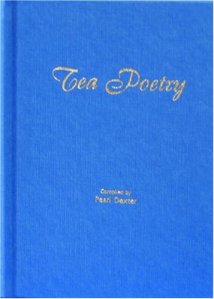 Tea Poetry, compiled by Pearl Dexter (Olde English Tea Company, Inc., 2003). This is a handsome gift book for tea aficionados featuring 60 poems spanning centuries, from the Chinese Jin Dynasty (265-420 A.D.) to the 21st century. There’s a mix of serious, humorous, and whimsical poems perfect for reflection and contemplation. It includes poets such as Emerson, Eliot, Brooke, Basho and Issa, but the majority of poets were new to me. The verses are presented on creamy parchment paper with gold and dark blue borders, blue font, gold calligraphy and filigree accents. Pearl Dexter founded Tea A Magazine (now The Daily Tea), to educate the public about tea culture.
Tea Poetry, compiled by Pearl Dexter (Olde English Tea Company, Inc., 2003). This is a handsome gift book for tea aficionados featuring 60 poems spanning centuries, from the Chinese Jin Dynasty (265-420 A.D.) to the 21st century. There’s a mix of serious, humorous, and whimsical poems perfect for reflection and contemplation. It includes poets such as Emerson, Eliot, Brooke, Basho and Issa, but the majority of poets were new to me. The verses are presented on creamy parchment paper with gold and dark blue borders, blue font, gold calligraphy and filigree accents. Pearl Dexter founded Tea A Magazine (now The Daily Tea), to educate the public about tea culture.
Blooming tea flowers
Sparrows playing hide and seek
Under the bushes~Kobayashi Issa
* * *
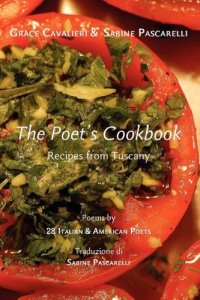 The Poet’s Cookbook: Recipes from Tuscany, Poems by 28 Italian & American Poets, edited by Grace Cavalieri and Sabine Pascarelli (Bordighera Press, 2009). A mouthwatering collection of totally doable Tuscan recipes and delectable poems presented in both English and Italian by such poets as Linda Pastan, Diane Lockward, Michael S. Glaser, Judy Neri, and Vivian Shipley.
The Poet’s Cookbook: Recipes from Tuscany, Poems by 28 Italian & American Poets, edited by Grace Cavalieri and Sabine Pascarelli (Bordighera Press, 2009). A mouthwatering collection of totally doable Tuscan recipes and delectable poems presented in both English and Italian by such poets as Linda Pastan, Diane Lockward, Michael S. Glaser, Judy Neri, and Vivian Shipley.
Writing and cooking friends Grace Cavalieri (Annapolis, Maryland) and Sabine Pascarelli (Tuscany) share recipes that were once purely Italian and are now becoming Italo-American. They’re both authors and poets (you may know Grace as the radio host of “The Poet and the Poem” from the Library of Congress), who share a common culinary heritage and treasure the sense of community that cooking naturally affords.
Recipes include Appetizers (Mozzarella in a Carriage), Soups (Vegetable and Bread Soup), First Course (Risotto with Safron), Second Course (Tuscan Stew), Vegetables (Italian String Beans), Salads (Country Tuscan Bread Salad), and Desserts (Hazelnut Cake). The poems are by turns sensual, lyrical, thought-provoking, evocative, and thoroughly satisfying. Truly a feast for the senses. (I reviewed the book in more detail here, with a sample poem and recipe.)
* * *
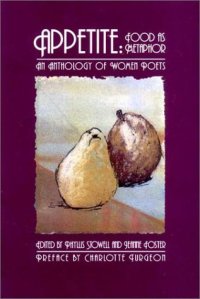 Appetite: Food as Metaphor (An Anthology of Women Poets), edited by Phyllis Stowell and Jeanne Foster (BOA Editions, 2002). In poems from as varied women poets as Jane Kenyon, Lucille Clifton, and Anne Sexton, food emerges as a re-occurring and central metaphor in the way women live, in the pulse of the everyday, and as a vehicle for the exotic. From coffee to caviar, from potatoes to dandelions—even in hunger and anorexia—the metaphors of food have worked like yeast in the imagination of these poets.
Appetite: Food as Metaphor (An Anthology of Women Poets), edited by Phyllis Stowell and Jeanne Foster (BOA Editions, 2002). In poems from as varied women poets as Jane Kenyon, Lucille Clifton, and Anne Sexton, food emerges as a re-occurring and central metaphor in the way women live, in the pulse of the everyday, and as a vehicle for the exotic. From coffee to caviar, from potatoes to dandelions—even in hunger and anorexia—the metaphors of food have worked like yeast in the imagination of these poets.
Excellent collection of 75 poems grouped around five themes: family, sexuality, oppression, death, and transformation. The poems, written by American women of the last 200 years, “represent a diversity of cultural, social, political, psychological, spiritual, ethical and aesthetic perspectives.”
As these women speak of their intimate relationships with food, expressing their joy, rage, and yearnings, we see how food can be an incisive lens for viewing life’s imperatives. Favorites: “Bite into the Onion” by Marge Piercy, “On Stopping Late in the Afternoon for Steamed Dumplings,” by Toi Derricotte, “How to Stuff a Pepper,” by Nancy Willard, and “All the Soups” by Martha Rhodes.
* * *
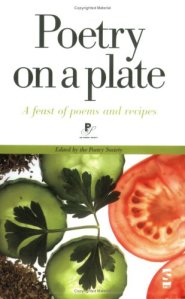 Poetry on a Plate: A Feast of Poems and Recipes, edited by the Poetry Society (Salt Publishing, 2004). This is a unique collection of poems, recipes and food musings by top UK poets, chefs and food writers, published in conjunction with National Poetry Day 2004, which was devoted to celebrating the theme of Food.
Poetry on a Plate: A Feast of Poems and Recipes, edited by the Poetry Society (Salt Publishing, 2004). This is a unique collection of poems, recipes and food musings by top UK poets, chefs and food writers, published in conjunction with National Poetry Day 2004, which was devoted to celebrating the theme of Food.
It was interesting and enlightening to explore the creative impulses that chefs and poets share — how both bring their levels of skill, life experiences, memories, and instincts to create something original from scratch. The book begins with A Visit to the Poetry Café in Covent Garden, with recipes from café cooks as well as poets who’d been invited to cook and host dinners there.
The bulk of the collection is devoted to poems and recipes grouped according to Appetisers, Mains and Sides, and Puddings, with a National Poetry Day Menu topping everything off. Though none of the poets were familiar to me, I certainly enjoyed discovering “new” ones like John Agard, Matthew Sweeney, Sarah Wardle, and Ian McMillan, and found myself intrigued with dishes such as Tagliatelle with Fig and Chilli, Badaam Kali Murg, and Valrhona Chocolate Pudding. I’ve featured several of the poems on this blog before, including “Making Lemon Curd” by Robert Seatter and “Word Tasting” by Sarah Wardle.
* * *
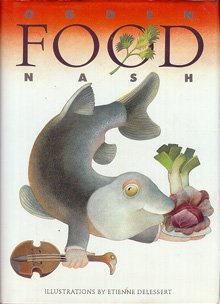 Food by Ogden Nash, illustrations by Etienne Delessert (Stewart, Tabori & Chang, 1998). If you’re an Ogden Nash fan, you’ll likely grin, giggle, and maybe even guffaw over the fetching smorgasbord of witty nuggets in this little book. Paired with Delessert’s clever, quirky duotone illustrations, these verses with verve are perfect for a sassy afternoon snack, a sly nip before dinner, or whenever you need a quick happy fix. No doubt you’re familiar with Nash’s “Candy is dandy/but liquor is quicker,” which is included here, along with other delightful bon mots and longer poems which make you wonder what the chef might have slipped into Mr. Nash’s bouillabaisse.
Food by Ogden Nash, illustrations by Etienne Delessert (Stewart, Tabori & Chang, 1998). If you’re an Ogden Nash fan, you’ll likely grin, giggle, and maybe even guffaw over the fetching smorgasbord of witty nuggets in this little book. Paired with Delessert’s clever, quirky duotone illustrations, these verses with verve are perfect for a sassy afternoon snack, a sly nip before dinner, or whenever you need a quick happy fix. No doubt you’re familiar with Nash’s “Candy is dandy/but liquor is quicker,” which is included here, along with other delightful bon mots and longer poems which make you wonder what the chef might have slipped into Mr. Nash’s bouillabaisse.
Even if you don’t want him to, he shares his impressions of “cantaloupes, parsnips, sweetbreads, celery, tarragon, assorted chocolates, and much more,” and he certainly isn’t shy about revealing his likes (“I’m mad about mustard — even on custard”) and dislikes (“Parsley/Is gharsley”). Culinary chapters include Pheasant is Pleasant, I’ll Take a Bun, Men are Gluttons, It’s the Liquor, Celery, Raw, Are You Reading a Cookbook? and If These Be Herbs. Mind your funny bones; they’re bound to be tickled. Golly gee, looks like I mentioned this book before, along with “The Clean Platter.”
Let us call Yorkshire pudding
A fortunate blunder;
It’s a sort of popover
That tripped and popped under.
*
What a pity that aspic
Doesn’t rhyme with elastic,
Because gee whiz,
It is.
* * *
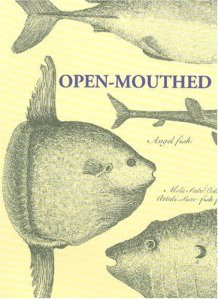 Open-Mouthed: Poems on Food by James Crowden, Lawrence Sail, Alan Peacock, and Elisabeth Rowe (Prospect Books, 2006). This little book contains a surprising 64 poems by four Devon poets, and was initially published to help fund a bursary scheme enabling young students to attend the Dartington ‘Ways with Words’ literary festival. The poems are probably best appreciated by Anglophiles, especially those interested in the culinary culture of the region, or by those who enjoy flavors of faraway places.
Open-Mouthed: Poems on Food by James Crowden, Lawrence Sail, Alan Peacock, and Elisabeth Rowe (Prospect Books, 2006). This little book contains a surprising 64 poems by four Devon poets, and was initially published to help fund a bursary scheme enabling young students to attend the Dartington ‘Ways with Words’ literary festival. The poems are probably best appreciated by Anglophiles, especially those interested in the culinary culture of the region, or by those who enjoy flavors of faraway places.
I did enjoy “meeting” these four poets within the pages of this book since their frames of reference are so different from mine and I did learn a lot. Though most of the poems touch upon universal themes, they might have had more impact on first reading if I had been more familiar with certain place names, etc. Favorites: “Ode to a Cornish Pasty” by James Crowden, “Capiscum Rap” by Alan Peacock, “Devon Cream Tea” by James Crowden.
In Open-Mouthed, the reader can find a rich à la carte menu of poems, some al dente, others al fresco, succulent morsels plucked from hedgerows and kitchens at home and abroad . . . So here you will find, or instance, Cornish earlies alongside borscht, pistachios and mussels, wild mushrooms mixing with a hostess trolley, artichokes and alphabet soups, tripe an’ cow ‘eels, sad cake and sloes, trout hatcheries, mushy peas, mammoths and the Meat Commission: dishes to suit all tastes.
Here’s an example of an easily digested poem with a universal theme:
EDIBLE CHILD
by Elisabeth RoweSleeping child
I bend to breathe your
melon-scented infant skin,
I taste the soft bloom
on your plum-skin arms,
tickle my nose on the hairs
of your gooseberry legs,
nibble your fillet toes.Edible child
once upon a time
I heard my mother’s hunger:I love you so much
I could eat you all up.
* * *
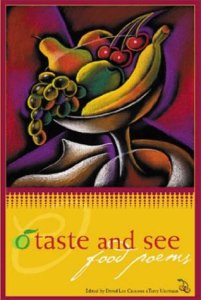 O Taste and See: Food Poems, edited by David Lee Garrison and Terry Hermesen (Bottom Dog Press, 2003). This collection contains 200 pages of food poems by about 100 of America’s finest modern poets (Denise Levertov, Elizabeth Bishop, Robert Frost, Frank O’Hara, William Carlos Williams, Charles Simic, Billy Collins, Rita Dove, Susan Rich, Diane Wakoski, Joyce Sutphen, Wendell Berry) and is sure to please a wide variety of palates and appetites. Poems are grouped in nine sections: Friends, Recipes, Family, Garden, Stories, Odes, Love, Market, World.
O Taste and See: Food Poems, edited by David Lee Garrison and Terry Hermesen (Bottom Dog Press, 2003). This collection contains 200 pages of food poems by about 100 of America’s finest modern poets (Denise Levertov, Elizabeth Bishop, Robert Frost, Frank O’Hara, William Carlos Williams, Charles Simic, Billy Collins, Rita Dove, Susan Rich, Diane Wakoski, Joyce Sutphen, Wendell Berry) and is sure to please a wide variety of palates and appetites. Poems are grouped in nine sections: Friends, Recipes, Family, Garden, Stories, Odes, Love, Market, World.
In their Introduction, the editors interestingly observe that while in times past, food might have been considered not lofty enough a subject for serious art, in modern times we might have “come to see in everyday things the depth of our existence.” These poems ask us to examine with words “the sources of sustenance, of memory and community that food brings to our lives . . . ” While working on this anthology, they were surprised by the wealth of food poems available, attributing it to “a number of deep collective wishes: to return to our roots, as well as to savor slower, more diverse tastes.”
In these poems food tells us about our heritage, who we are, about love, our rituals, about giving and gorging, it tells us of the sweetness and abundance of life, what might have been, that reading can make us hungry. 🙂 Ultimately it tells us that “we need poetry as much as we need food.” Favorites: “Kitchen Logistics” by Lois Beebe Hayna, “Reading the Menu” by Natasha Sajé, “For My Friends, Who Complain That I Never Write Anything Happy” by William Greenway. Not too long ago I featured Jeff Gundy’s “Cookie Poem,” which is included in this book.
* * *
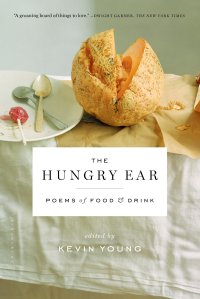 The Hungry Ear: Poems of Food and Drink, edited by Kevin Young (Bloomsbury USA, 2012). Food and poetry: in so many ways, a natural pairing, from prayers over bread to street vendor songs. Poetry is said to feed the soul, each poem a delicious morsel. When read aloud, the best poems provide a particular joy for the mouth. Poems about food make these satisfactions explicit and complete.
The Hungry Ear: Poems of Food and Drink, edited by Kevin Young (Bloomsbury USA, 2012). Food and poetry: in so many ways, a natural pairing, from prayers over bread to street vendor songs. Poetry is said to feed the soul, each poem a delicious morsel. When read aloud, the best poems provide a particular joy for the mouth. Poems about food make these satisfactions explicit and complete.
Of course, pages can and have been filled about food’s elemental pleasures. And we all know food is more than food: it’s identity and culture. Our days are marked by meals; our seasons are marked by celebrations. We plant in spring; harvest in fall. We labor over hot stoves; we treat ourselves to special meals out. Food is nurture; it’s comfort; it’s reward. While some of the poems here are explicitly about the food itself: the blackberries, the butter, the barbecue–all are evocative of the experience of eating.
Many of the poems are also about the everything else that accompanies food: the memories, the company, even the politics. Kevin Young, distinguished poet, editor of this year’s Best American Poetry, uses the lens of food – and his impeccable taste – to bring us some of the best poems, classic and current, period.
If I had to choose just one food poetry anthology for a permanent place on my shelves, I would go with The Hungry Ear. I return to this soul nourishing 158-poem collection again and again; no matter the time of year, emotional need, or specific hunger, I always find something that hits the spot. Poems are grouped seasonally from the Harvest Moon’s First Harvest, to Wintering’s Soup Lines & Staples, to Spring Rain’s Pig Out, and finally to Sweet Summer’s Short Orders and Forbidden Fruit.
Wonderful epigraphs whet the appetite for each section and sub-section, there’s a stellar roster of top-notch international poets (Mary Oliver, Theodore Roethke, Mark Strand, Rumi, Charles Baudelaire, Langston Hughes, Seamus Heaney, Pablo Neruda), and the poems themselves “honor food’s unique yet multifaceted pleasures,” show food’s healing power after loss, and the role it plays in celebrating an occasion or a season, in everyday and extraordinary ways.
“Food too can be where we experience, or reclaim, culture . . . The table is literally where we experience the spice of life; and learn the names of spices in other tongues. Food is often our first adventure with another culture and a way we learn to measure our own.” Young has set a bountiful table featuring an omnivorous menu with a focus on “source foods” and “eating local.” Poems I’ve featured from this anthology include “A Short History of the Apple” by Dorianne Laux and “Butter” by Elizabeth Alexander.
* * *
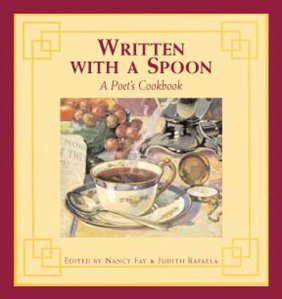 Written with a Spoon: A Poet’s Cookbook, edited by Nancy Fay and Judith Rafaela (Sherman Asher Publishing, 2002). Written With A Spoon: A Poet’s Cookbook is a delightful collection of poetry and recipes which celebrates the symbolic relationships uniting body and soul and is beauty and sustenance for both. In this eclectic collection, original poems from 64 poets nationwide are combined with favorite and heirloom recipes to crate a melting pot of unique flavors including Mexican frijoles, Jewish matzah balls, elegant pastas and decadent brownies. Over seventy recipes, presented in their entirety on the right page are paired on the facing page with related poems that seem to weave into the ingredient list a touch of romance and a spoonful of laughter. A splendid addition for any culinary collection! ( Midwest Book Review)
Written with a Spoon: A Poet’s Cookbook, edited by Nancy Fay and Judith Rafaela (Sherman Asher Publishing, 2002). Written With A Spoon: A Poet’s Cookbook is a delightful collection of poetry and recipes which celebrates the symbolic relationships uniting body and soul and is beauty and sustenance for both. In this eclectic collection, original poems from 64 poets nationwide are combined with favorite and heirloom recipes to crate a melting pot of unique flavors including Mexican frijoles, Jewish matzah balls, elegant pastas and decadent brownies. Over seventy recipes, presented in their entirety on the right page are paired on the facing page with related poems that seem to weave into the ingredient list a touch of romance and a spoonful of laughter. A splendid addition for any culinary collection! ( Midwest Book Review)
This gem was originally published in 1996, then re-issued with a new cover in 2002. The majority of recipes are from the poets themselves and relate directly to some aspect of the poems. Truly a sensory feast enhancing both the reading and cooking experience, poem and recipe play off each other in an intimate way, deepening our appreciation of the poets’ social and cultural milieux.
There’s also a nice mix of cuisines — Chinese, Japanese, Mexican, French, Italian, Mediterranean. Poems and recipes are grouped by course (Appetizers, Soups, Pastas and Breads, Entrees, and Desserts), in addition to a section on Comfort Foods and Cafe Culture (poems without recipes). Favorites: “My Husband Looks Nothing Like Paul Prudhomme” by Stella Reed (Peter’s Seafood Gumbo), “Praise Song for Cilantro” by Susan McCarthy (Hot Meatloaf a las Carnitas), “A Simple Flan” by Deborah Casillas (Flan), “Grief is Like an Onion” by Katrina Barch (Breakup Beef Bourguignonne).
* * *
COMING SOON: This one will be released on May 15, 2015, and I can’t wait to see it!
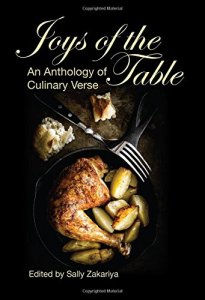 Joys of the Table, edited by Sally Zakariya (Richer Resources, 2015). “The joys of the table belong equally to all ages, conditions, countries and times; they mix with all other pleasures, and remain the last to console us for their loss.” (Jean Anthelme Brillat-Savarin). Food is our common ground, a universal experience, wrote gastronomist and cookbook author James Beard.
Joys of the Table, edited by Sally Zakariya (Richer Resources, 2015). “The joys of the table belong equally to all ages, conditions, countries and times; they mix with all other pleasures, and remain the last to console us for their loss.” (Jean Anthelme Brillat-Savarin). Food is our common ground, a universal experience, wrote gastronomist and cookbook author James Beard.
No matter the distance or language or years that divide us, eating is an experience we all share. Joys of the Table explores the many facets of our complex relationships with food, from our fondest kitchen memories to ways we express our love through food, from a child s hunger to a holiday celebration, from lighthearted menus to intimations of our final meals. Virginia poet Sally Zakariya has gathered almost 100 poems from 75 poets for this anthology. The result is a rich poetic feast, sprinkled with occasional recipes from the poets themselves, a delicious dish for food-lovers and verse-lovers alike.
* * *
CHECK THESE OUT TOO!
Not food poetry anthologies per se, but excellent single author collections that contain some wonderful food poems. I love the way these female poets write about food!
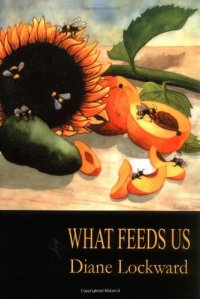 What Feeds Us by Diane Lockward (Wind Publications, 2006). In these sparkling poems, Diane Lockward takes life as it comes and finds nourishment in it all: succulence of the peach, redolence of the pear, the “green grape of sorrow.” I love these poems for their craft, sensuality and energy. Like high-wire acts of language and imagination, they almost leap in the air and come down again on the wire, balancing between witty and dark, personal and invented, idea and emotion. (Patricia Fargnoli)
What Feeds Us by Diane Lockward (Wind Publications, 2006). In these sparkling poems, Diane Lockward takes life as it comes and finds nourishment in it all: succulence of the peach, redolence of the pear, the “green grape of sorrow.” I love these poems for their craft, sensuality and energy. Like high-wire acts of language and imagination, they almost leap in the air and come down again on the wire, balancing between witty and dark, personal and invented, idea and emotion. (Patricia Fargnoli)
I previously featured “Blueberry” from this book.
*
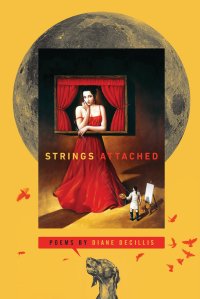 Strings Attached by Diane DeCillis (Wayne State University Press, 2014). In Strings Attached, poet Diane DeCillis takes inspiration from the story of the elephant calf with a thin rope tied to its leg. Even when it grows into a massive animal, the elephant thinks the same string still restrains it and never attempts to break free. This powerful, funny, and sometimes self-deprecating collection considers all the ways that strings bind us in relationships and explores their constant tightening and loosening. Although we may never sever the strings attached to our wounds, DeCillis shows that when given enough slack we can create the illusion of having been set free.
Strings Attached by Diane DeCillis (Wayne State University Press, 2014). In Strings Attached, poet Diane DeCillis takes inspiration from the story of the elephant calf with a thin rope tied to its leg. Even when it grows into a massive animal, the elephant thinks the same string still restrains it and never attempts to break free. This powerful, funny, and sometimes self-deprecating collection considers all the ways that strings bind us in relationships and explores their constant tightening and loosening. Although we may never sever the strings attached to our wounds, DeCillis shows that when given enough slack we can create the illusion of having been set free.
My review of this title is here.
*
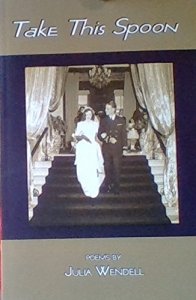 Take This Spoon by Julia Wendell (Main Street Rag Publishing, 2014). Julia Wendell’s Take This Spoon is an absolutely ingenious collection, melding recipes for the kitchen with poems reflecting upon family life—and it’s nothing less than delicious. The shifting constellations of parents and children, the insistent place of food in our domestic dynamics, all of the fruits of the earth and the fruits of our families, these are the currency of Julia Wendell’s exciting and moving new book. The conversational ease of these poems allows us a truly remarkable intimacy with the poet. Trust me; this is a book to read slowly, savoring every page. (David St. John)
Take This Spoon by Julia Wendell (Main Street Rag Publishing, 2014). Julia Wendell’s Take This Spoon is an absolutely ingenious collection, melding recipes for the kitchen with poems reflecting upon family life—and it’s nothing less than delicious. The shifting constellations of parents and children, the insistent place of food in our domestic dynamics, all of the fruits of the earth and the fruits of our families, these are the currency of Julia Wendell’s exciting and moving new book. The conversational ease of these poems allows us a truly remarkable intimacy with the poet. Trust me; this is a book to read slowly, savoring every page. (David St. John)
Click here for my review and chat with poet Julia Wendell.
*
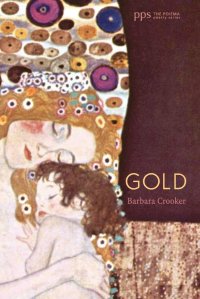 Gold by Barbara Crooker (Cascade Books, 2013). Barbara Crooker’s new book Gold focuses on one of the most profound life-altering experiences possible: losing one’s mother. This collection is an elegy, not just to the speaker’s mother, but to a lost Eden that cannot be reclaimed. Beginning with a series of lyrics set in autumn, the poems become more narrative, recounting the long illness of Crooker’s mother, her death, and the profound journey along the shores of grief. Throughout, Crooker is aware of the complexity and strength of the mother/daughter relationship and the chasm that this loss opens.
Gold by Barbara Crooker (Cascade Books, 2013). Barbara Crooker’s new book Gold focuses on one of the most profound life-altering experiences possible: losing one’s mother. This collection is an elegy, not just to the speaker’s mother, but to a lost Eden that cannot be reclaimed. Beginning with a series of lyrics set in autumn, the poems become more narrative, recounting the long illness of Crooker’s mother, her death, and the profound journey along the shores of grief. Throughout, Crooker is aware of the complexity and strength of the mother/daughter relationship and the chasm that this loss opens.
I featured “Peeps” from this book in September 2013.
* * *
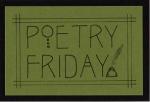 The beautiful, talented and witty Michelle Heidenrich Barnes is hosting the roundup at Today’s Little Ditty. Mix a few metaphors, simmer a stanza or two, and enjoy the full menu of poetic goodness being served up in the blogosphere this week. Mangia, mangia!
The beautiful, talented and witty Michelle Heidenrich Barnes is hosting the roundup at Today’s Little Ditty. Mix a few metaphors, simmer a stanza or two, and enjoy the full menu of poetic goodness being served up in the blogosphere this week. Mangia, mangia!
————————————
Copyright © 2015 Jama Rattigan of Jama’s Alphabet Soup. All rights reserved.

As someone who loves to cook (and eat!!) these look intriguing…thanks for sharing, Jama! I’ll have to look for these, especially “Joys.”
LikeLike
Have fun digging into these, Matt. 🙂
LikeLike
What a feast, Jama! Thank you for rattling off the house specials with such care and detail. And thank you also for helping me to decide what to get my dad for Father’s Day! I think one or two of these will leave him sated. 🙂
LikeLike
Didn’t know your Dad liked food poems, Michelle! He sounds like a keeper :)!
LikeLike
what a mouth-watering array of books–yum! And am happy to see “Joys of the Table” in the group, in which a poem of mine appears. Thank you so much, Jama, for all you do for food and poetry (and bears and Colin!)…happy eating!
LikeLike
Can’t wait to see your poem, Sharon!
LikeLike
The poem from Open-Mouthed made me sigh and the Ogden Nash verses made me laugh out loud. Thanks for sharing this buffet of books!
LikeLike
You’re very welcome, Penny!
LikeLiked by 1 person
Jama, you tirelessly answer Neruda’s call to share poetry with our “vast, incredible, extraordinary family of humanity” – written by the same! I can imagine you savoring all these great books on your shelves, with the occasional drop of tea of fleck of flour on favorite pages. Thanks for sharing with your hungry readers!
(And – smackeral? Now THAT is a tasty word. It is going to be playing in my head all day… smackeral!)
LikeLike
Smackerel came straight from Winnie the Pooh and Christopher Robin. Hungry bears are always up for a little smackerel of something :).
LikeLike
Ahhhhh… of course! ;0)
LikeLiked by 1 person
Appreciations Jama. For all the titles but I do love my Ogden Nash so that’s for the reference.
Not sure this fits (a children’s collection) but you may want to nibble
SWEETS AND TREATS A Book of Dessert Poems selected by poet Bobbye Goldstein & illustrated by Kty Couri
And thank you for sharing the poignant MD book – my thoughts are with you this weekend…
LikeLike
Hadn’t heard of Sweets and Treats — will look for it!
Barbara’s book touched so many chords. MD has become a different ball game altogether. Trying to focus on pleasant memories. Thanks for the kind thoughts, Jan.
LikeLike
Thanks for your delicious selection of poetry and food books! I haven’t heard of most of these. I do have all of Young, Crooker, and Lockwoods books, and they are all fabulous. I can’t wait to buy many on your list today!
There’s one you didn’t mention, Irrepressible Appetites, ED. Tracy Broussard, Rock Press 2002. It’s chock full of poems, recipes, and stories about food written by contemporary poets (including me).
LikeLike
Thanks for the heads up! I’ll look for Irrepressible Appetites. Nothing better than digging into more food poems. Looking forward to seeing your poem :).
LikeLike
Wow! Who knew there were all these poetry anthologies about food? Thank you for introducing them to me. Gold just went on my to buy list.
LikeLike
You will enjoy GOLD, I’m sure. Barbara never disappoints.
LikeLike
They all sound great, but I have a ridiculous love for Ogden Nash’s doggerel. The Eat, Drink & Be Merry and O Taste and See sound fun, too.
LikeLike
Didn’t realize you were a Nash fan. 🙂
LikeLike
Thanks for a peek at your shelves!
LikeLike
Thanks for peeking :)!
LikeLike
Wow what a poetry feast! Thanks so much for finding these, Jama.
LikeLike
It took me almost 8 years to find just these 10. There really should be many more.
LikeLiked by 2 people
Wow!
LikeLike
Before our used book super-store lost their lease and shut down, I was able to pick up several “Everyman’s Library Pocket Poets” volumes really cheaply. I missed getting Eat, Drink, and Be Merry. I’ll be on the lookout for that one!
LikeLike
That’s a nice series, isn’t it? I was surprised at the treats I found in Eat, Drink and Be Merry. Hope you find a copy sometime. 🙂
LikeLike
Love!
LikeLiked by 1 person
May the feast be with you. 🙂
LikeLike
Now I’m hungry for brunch and poetry. I will have to get a couple of these, none of which I have. What a high standard you are setting for food related poems. I may be too scared to try writing one now. Nah, let’s wing it!
Taking the Cake
Chocolate truffle
What a kerfluffle —
When they found,
It had been downed
In one mighty gulp,
Mashed to pulp.
Only a shiny smear
On my lips and a tear
From savoring the taste,
Now it’s gone, what a waste.
Consternation and wailing,
Bereft arms flailing.
Should I feel bad
Because they are mad?
It was so good for my mood
Even if abstracting it was rude.
Now where’s the cake?
Another taste to take…
This poem is for you, Jama. It came from my inner child, about whom no truffle was ever safe. XOXO, Brenda
LikeLiked by 1 person
Brava! You are the best, Brenda! I can see not a single piece of chocolate is safe in your presence. . . as it should be. 😀
LikeLike
LOL I’m a kid at heart. I love your posts.
LikeLiked by 1 person
What a wonderful list! I have to admit that Ogden Nash is a favorite.
LikeLike
He’s definitely one of a kind!
LikeLike
You say, “If I had to pick one . . .” I immediately add it to my wish list. 🙂 Thanks!
LikeLike
Yay! Great choice!
LikeLike
Thank you for sharing this delectable collection today, Jama! I feel like I’m at a sumptuous buffet and don’t know which treat to taste first.
LikeLike
Thanks for coming to the buffet! Hope you treat yourself to one or two of these titles sometime. 🙂
LikeLike
Oh, what a feast of poetry! I love the idea of being able to “dip, sip, savor, nibble and nosh on the poems ” in these collection, Jama, each of which looks more glorious than the next.
LikeLike
Nothing like a bit of food poetry to hit the spot. 🙂
LikeLike
What a fun collection! Makes one hungry…and thoughtful!
LikeLike
Yes, a different kind of nourishment!
LikeLike
I can’t believe there are so many choices of anthologies about food!! Though it’s no good for recipes, I have to say Ogden Nash’s book is the one I would buy – if only for “Parsley/Is Gharsley.” That’s so terrible it’s wonderful!
LikeLike
The art in the Nash book is a lot of fun too. 🙂
LikeLike
Why don’t we think more about food poetry?!? These sound great. I will keep an eye out for The Hungry Ear.
LikeLike
The Hungry Ear is a wonderful anthology. Kevin Young has exquisite taste :).
LikeLike
Charming site.
LikeLiked by 1 person